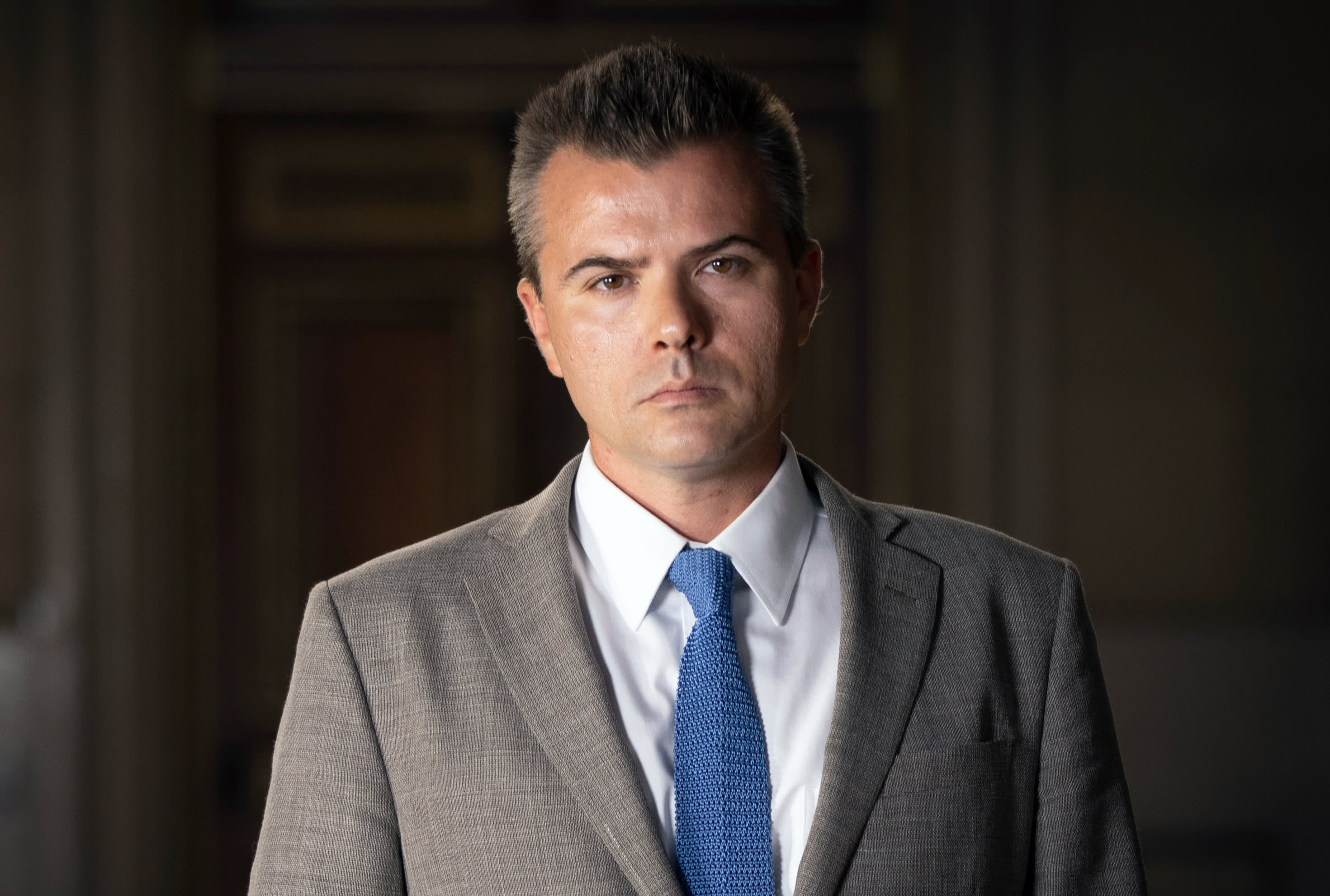
Igor Danchenko, a Russia analyst who gathered material for the Steele dossier, said he found his sources credible but that he took their information with a “grain of salt.”
Jonah M. Kessel | The New York Times/Redux
An analyst who contributed key research to the so-called Steele dossier that detailed alleged ties between ex-President Donald Trump and Russia during the 2016 election was arrested Thursday as part of a probe by special counsel John Durham.
Igor Danchenko, the analyst, was charged in a grand jury indictment with five counts of making false statements to FBI agents during several interviews with agents in 2017 about his work providing former British spy Christopher Steele information for the dossier.
Steele’s controversial dossier on Trump became the basis for the application of an FBI warrant to tap the phone of former Trump campaign advisor Carter Page a month before Election Day in 2016
Steele’s inquiry was funded by the firm Fusion GPS, which itself had been hired by the Democratic National Committee to conduct opposition research on the then-Republican candidate Trump.
Danchenko, 43, is the third person criminally charged in Durham’s investigation, which is focused on the origins of the federal probe into the Trump campaign’s suspected coordination with Russian agents to influence the outcome of the 2016 race for the White House.
The Department of Justice said that Danchenko, a Russian national who lives in Virginia, was taken into custody Thursday morning. He is due to appear in federal court in Virginia on Thursday afternoon.
The indictment charges that Danchenko lied when he told FBI agents he had never communicated with a public relations executive who was active in Democratic politics about allegations in Steele’s reports, when in fact Danchenko had sourced at least one of those allegations to the executive.
Danchenko also is accused of falsely telling agents that he received an anonymous phone call in July 2016 from a person he believed to be the then-president of the Russian-American Chamber of Commerce about information that later was described by Steele as a “conspiracy of cooperation” between Trump’s campaign and Russian officials.
“The information purportedly conveyed by the anonymous caller included the allegation that there were communications ongoing between the Trump campaign and Russian officials and that the caller had indicated the Kremlin might be of help in getting Trump elected,” Durham’s office said in a press release.
The indictment says that Danchenko “never received such a phone call or such information” from that person, and that he never arranged to meet that person in New York, as he has claimed to FBI agents.
The indictment charges that Danchenko’s lies had a major impact on the FBI’s investigation of the Trump campaign.
It notes that the FBI’s applications for warrants related to Page heavily relied on Steele’s reports to Fusion GPS, which were based on information Danchenko had collected.
The FBI “ultimately was not able to confirm or corroborate most of their substantive allegations,” the indictment says.
Some of Danchenko’s alleged lies “deprived FBI agents and analysts of probative information” that would have helped them vet the reliability of the reports they received, the indictment says.
Christopher Schafbuch, a lawyer who represented Danchenko in a 2017 civil case, would not confirm or deny that he was currently Danchenko’s lawyer.
In September, Durham obtained an indictment against then-Perkins Coie law firm partner Michael Sussman for allegedly lying to the FBI when he offered a tip in 2016 about the possible secret electronic channel between Trump’s company and a Russian bank. Sussman has denied the allegation.
In January, a former FBI lawyer, Kevin Clinesmith, was sentenced to probation for having falsified a claim that was used to maintain surveillance of Page.
Christopher Steele, the former MI6 agent in London where he speaks to the media for the first time, March 7, 2017.
Victoria Jones | PA Images | Getty Images
Trump and his allies have strongly criticized the Steele dossier, which contains unsubstantiated and refuted claims.
They have argued that the entire original federal probe into Trump’s ties to Russia and possible obstruction of justice by Trump for seeking to undercut the inquiry was groundless and tainted by political motivations because of the Steele dossier.
The investigation by former special counsel Robert Mueller found that there was an aggressive effort by Russian agents to use social media and computer hacking to help Trump’s bid to win the presidency over Democratic nominee Hillary Clinton. But Mueller said he did not find enough evidence to charge Trump campaign affiliates with conspiring with the Russians in that effort.
Mueller also did not charge Trump with any wrongdoing, but his final report pointedly did not exonerate the then-president.
“If we had had confidence that the president clearly did not commit a crime, we would have said so,” Mueller told reporters in 2019.
Mueller did file more than 100 criminal charges being filed against three Russian companies and nearly three dozen individuals, including half a dozen former Trump advisors, among them former Trump campaign chief Paul Manafort.
Durham was tasked with investigating the roots of the Trump-Russia probe during the Trump administration.
Trump himself had repeatedly called the Mueller probe a “witch hunt.” But he has also repeatedly expressed frustration with Durham’s investigation, which to date has not resulted in criminal charges that seriously undercut the findings of Mueller’s probe.




